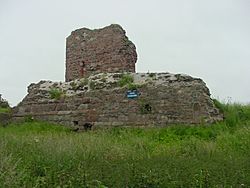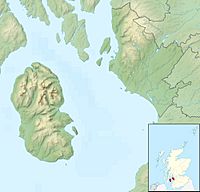Ardrossan Castle facts for kids
Quick facts for kids Ardrossan Castle |
|
|---|---|
| Ardrossan, Ayrshire on the west coast of Scotland | |

Ardrossan Castle
|
|
| Coordinates | 55°38′N 4°49′W / 55.64°N 4.81°W |
| Type | Castle of enceinte |
| Site information | |
| Open to the public |
No. Fenced and under video surveillance. (caution advised due to loose rocks) |
| Condition | Ruined |
| Site history | |
| Built | around 1140 |
| Built by | Simon de Morville |
| Materials | stone wood and metal |
Ardrossan Castle is an old ruined castle on the west coast of Scotland. It is located in the town of Ardrossan, in an area called Ayrshire. The castle sits on a rocky hill above the town. It was once protected by a deep ditch, called a moat.
Inside the castle, there is a tall main tower, known as a keep, which was built in the 1400s. There are also vaulted rooms that once held a kitchen and cellars. A deep passage leads to a well. Part of the keep still stands, but it is mostly in ruins.
The first castle here belonged to the Clan Barclay. It was partly destroyed during the Wars of Scottish Independence. During this time, the English soldiers guarding the castle were defeated. This event became known as "Wallace's Larder." This name is still used for the remaining underground rooms. The castle was rebuilt by the Clan Montgomery in the 1400s. Later, in the 1600s, soldiers of Oliver Cromwell partly pulled it down. They used its stones to help build a fort called the Ayr Citadel.
Contents
History of Ardrossan Castle
Ardrossan Castle is built on a rocky hill. Its name comes from two old words: ard, meaning height, and rossan, meaning a rocky point. The ruins you see today are on the site of an even older castle. This first castle was owned by the Barclay family. By the 1200s, it had passed to the Ardrossan family.
The castle has always been an important landmark for the town of Ardrossan. In 1847, a travel guide called Sylvan's Pictorial Handbook to the Clyde described it. The book said the castle showed the area's history. It also mentioned that you could see beautiful views of the ocean from the castle. The authors, Thomas and Edward Gilks, wrote that Ardrossan was first called "Castle Crags." It was later renamed Ardrossan after the family who owned it. At that time, the castle belonged to the Eglintoun family. It was already a ruin and stood next to an old churchyard.
Cromwell's Destruction
The castle stood until 1648. That year, Oliver Cromwell's soldiers destroyed much of it. They took many of the stones to Ayr to build a new fort. This fort was called the Ayr Citadel. The ruins of Ardrossan Castle still stand today. However, they are in a dangerous condition. Because of its historical importance, the building is now a Scheduled monument. This means it is a protected historical site.
Legends of Ardrossan Castle
Many old stories and legends are told about Ardrossan Castle.
The Ghost of William Wallace
One legend says that the ghost of William Wallace haunts the castle. People say he wanders through the ruins on stormy nights. William Wallace was a famous Scottish knight. He led the Scots in the Wars of Scottish Independence against England.
The Devil's Hoof Prints
The castle is also linked to a story about the Devil. Sir Fergus Barclay was a skilled horseman. He was known as "the De'il of Ardrossan," which means "the Devil of Ardrossan." His amazing skill came from a magical bridle. The Devil gave him this bridle in exchange for his soul.
However, Barclay was very clever. He tricked the Devil into giving his soul back. The Devil became very angry about this trick. In his rage, he attacked the castle. It is said that he left his hoof prints on one of the rocks. Sir Fergus Barclay is buried in the castle chapel. This chapel is located a short distance inland from the castle, further down the hill.
Gallery
-
Tunnel vault under the castle
See also
 In Spanish: Castillo de Ardrossan para niños
In Spanish: Castillo de Ardrossan para niños
 | Delilah Pierce |
 | Gordon Parks |
 | Augusta Savage |
 | Charles Ethan Porter |








